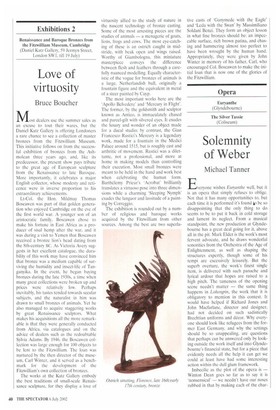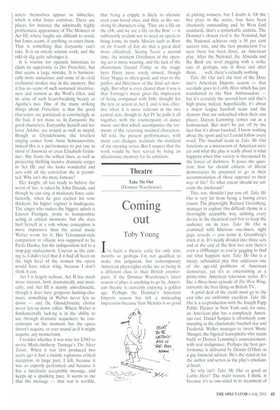Opera
Euryanthe (Glyndebourne) The Silver Tassie (Coliseum)
Solemnity of Weber
Michael Tanner
Everyone wishes Euryanthe well, but it is an opera that simply refuses to oblige. Not that it has many opportunities to, but each time it is performed it's found tip be so disappointing that the only thing to do seems to be to put it back in cold storage and lament its neglect. From a musical standpoint, the new production at Glyndebourne has a great deal going for it, above all in the pit. Mark Elder is the work's most fervent advocate, and he draws wonderful sonorities from the Orchestra of the Age of Enlightenment, as well as shaping the structures expertly, though some of his tempi are excessively leisurely. But the superb overture, the work's finest single item, is delivered with such panache and lyrical ardour that hopes are raised to a high pitch. The tameness of the opening scene needn't matter — the same thing happens in Lohengrin, the work that it is obligatory to mention in this context. It would have helped if Richard Jones and John Macfarlane, director and designer, had not decided on such sadistically Brechtian uniforms and decor. Why everyone should look like refugees from the former East Germany, and why the settings should be so unappealing, are questions that perhaps can be answered only by looking outside the work itself and into Glyndebourne's financial state, but for a piece that evidently needs all the help it can get we could at least have had some interesting action within the dull glum framework.
Imbecilic as the plot of the opera is — Winton Dean goes so far as to say it is 'nonsensical' we needn't have our noses rubbed in that by making each of the char acters themselves appear as imbeciles, which is what Jones contrives. There are places, for instance the admittedly highly problematic appearance of The Monster in Act III, where laughs are difficult to avoid, but Jones seems, if anything, to court them. That is something that Eloyanthe can't take. It is an utterly solemn work, and the odd sly dig quite sabotages it.
It is routine for operatic historians to claim its superiority to Der Freischlitz, but that seems a large mistake. It is harmonically more audacious, and some of its vivid orchestral strokes stay in the memory. But it has no scene of such sustained inventiveness and tension as the Wolf's Glen, and no arias of such heart-breaking beauty as Agathe's two. One of the many striking things about Freischntz is that the good characters are portrayed as convincingly as the bad, if not more so. In Etuyanthe the good characters, Euqanthe herself and her lover Adolar, are insipid as well as stupid, though at Glyndebourne the loveliest singing comes from Anne Schwanewilms, indeed this is a performance to put one in mind of Janowitz or even Elisabeth Griimmer. She floats the softest lines, as well as projecting thrilling incisive dramatic surges in Act III; and she looks wonderful and acts with all the conviction she is permitted. Why isn't she more famous?
Her knight, all too ready to believe the worst of her, is taken by John Daszak, and though he can sing at moderate force satisfactorily, when he gets excited his tone thickens; his higher register is inadequate. The singer who makes the biggest splash is Lauren Flanigan, prone to transpontine acting at critical moments, but she does hurl herself at a role whose conception is more impressive than the actual music Weber wrote for it. Her Telramund-style companion in villainy was supposed to be Pavia Hunka, but his indisposition led to a stop-gap replacement. Uneven as the casting is, I didn't feel that if it had all been on the high level of the women the opera would have taken wing, because I don't think it can.
Act I is largely tedious, Act II has much more interest, both dramatically and musically; and Act III is mainly anti-climactic, though it does have gorgeous hunting choruses. something in Weber never lets us down — and the Glyndebourne chorus never lets us down either. Where Weber is fundamentally lacking is in the ability to see through dramatic sequences; he concentrates on the moment, but the opera doesn't acquire, or ever sound as if it might acquire, any momentum.
I wonder whether it was wise for ENO to revive Mark-Anthony Turnage's The Silver Tussle. When it was first produced two years ago it had a mainly rapturous critical reception. in large part, I felt, because it was so expertly performed and because it has a timelessly acceptable message, and keeps up a spanking pace. It seems to me that the message -that war is terrible, that being a cripple is likely to alienate even your loved ones, and that, as the surviving fit characters sing, 'They are a life on the ebb, and we are a life on the flow' — is sufficiently evident not to need an opera to bring home its truth. Movies such as Born on the Fourth of July do that a great deal more effectively. Seeing Tussle a second time, the insistent Dirishness of the opening act is more wearing, and the lack of the charismatic Gerald Finley as the tragic hero Harry more sorely missed, though Gary Magee is often good, and rises to the pathos and bitterness of the final act movingly. But what is even clearer than it was is that Turnage's music gives the impression of being composed with little thought for the text or action in Act I, and is less effective when it is more relevant in the two central acts, though in Act IV he pulls it all together, with the counterpoint of dance music and that which accompanies the torments of the returning maimed characters. All told, the present performances, with many cast changes, maintain the standard of the opening series. But I suspect that the work would be best served by being an affectionate memory for its admirers.



























































 Previous page
Previous page